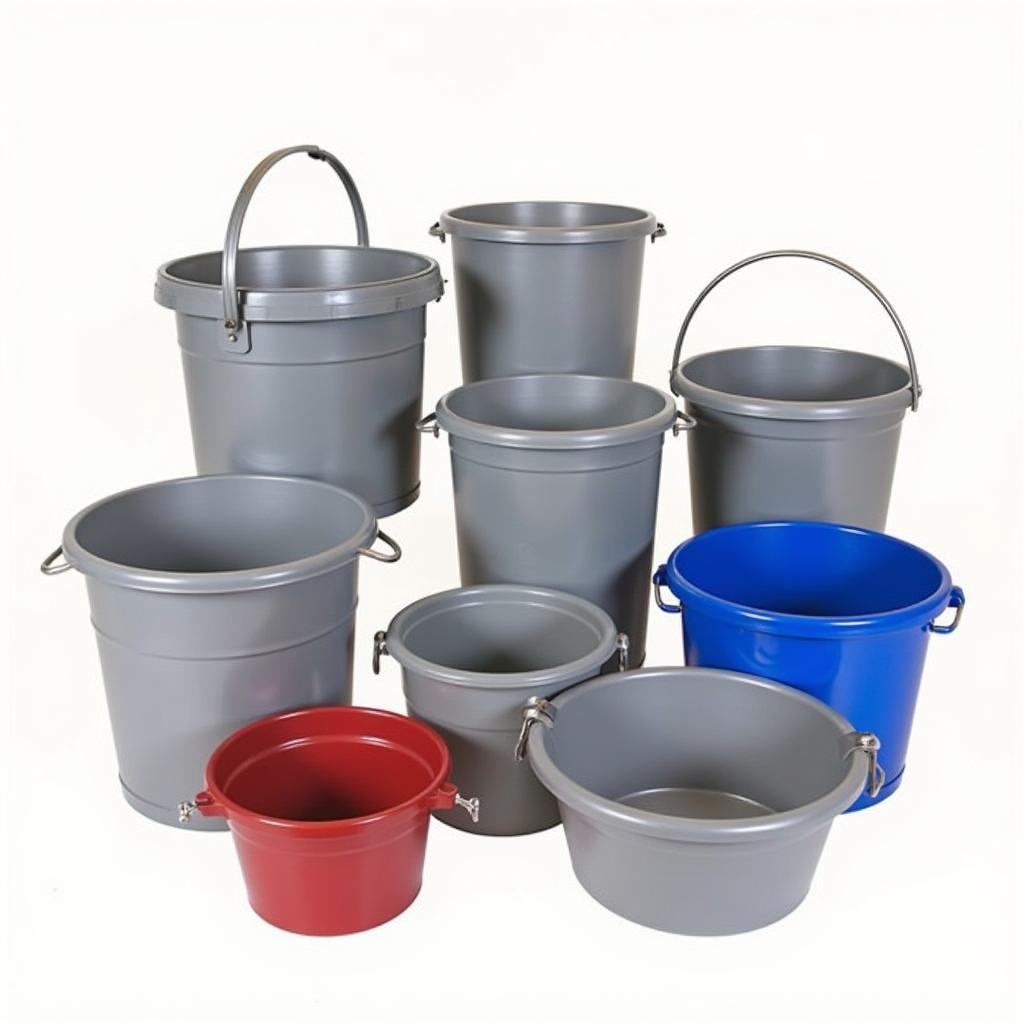A Horse Feed Bucket is more than just a container; it’s a crucial part of your horse’s daily routine. Selecting the right one ensures proper nutrition, minimizes waste, and supports your horse’s overall well-being. This guide delves into the essential factors to consider when choosing the perfect horse feed bucket for your equine companion.
Understanding Your Horse’s Needs and the Different Types of Horse Feed Buckets
Different horses have different needs when it comes to their feed buckets. Factors like age, size, breed, and dietary requirements play a crucial role in determining the best type of bucket. For example, senior horses might benefit from shallow, easy-access feed buckets for horses. A young, growing horse, on the other hand, will likely require a larger capacity bucket. Furthermore, consider the type of feed you provide. A bucket designed for pellets might not be suitable for soaked hay or mash. Common types of horse feed buckets include rubber, plastic, and metal.
Material Matters: Rubber, Plastic, or Metal?
Each material offers unique advantages and disadvantages. Rubber buckets are durable and less likely to crack in cold weather, making them a popular choice. Plastic buckets are lightweight, easy to clean, and come in various sizes and colors. Metal buckets are extremely sturdy, long-lasting, but can be heavy and prone to rust if not properly cared for. Choosing the best material often boils down to personal preference and specific needs. Do you need something lightweight and easy to transport or maximum durability that can withstand years of use?
 A variety of horse feed buckets showcasing different materials, sizes, and designs.
A variety of horse feed buckets showcasing different materials, sizes, and designs.
How to Choose the Right Size and Features
Size matters when selecting a horse feed bucket. Too small, and your horse might not get enough feed; too large, and it can lead to wastage and overeating. A good rule of thumb is to choose a bucket that holds the appropriate amount of feed for a single meal. Consider additional features such as handles for easy carrying and a flat bottom to prevent tipping. Some buckets are designed with special features to slow down fast eaters or accommodate horses with specific dental needs. These specialized horse feeder buckets can be invaluable for managing your horse’s feeding habits and overall health.
Tips for Slow Feeders and Special Needs
Horses that bolt their food can benefit from slow feeder buckets. These buckets have built-in obstacles that force the horse to eat more slowly, promoting better digestion and reducing the risk of choke. Feed buckets for horses that choke are a crucial investment for horses prone to this dangerous condition. If your horse has specific dental issues, consider buckets designed with shallower depths or specialized lips to facilitate easier access to food.
“A well-chosen feed bucket can significantly impact a horse’s digestive health,” says Dr. Emily Carter, Equine Nutritionist. “Slow feeders, for instance, can be game-changers for horses prone to choking or digestive upset.”
Cleaning and Maintenance: Keeping Your Horse’s Feed Bucket Sanitary
Regular cleaning is essential to maintain a hygienic feeding environment. Bacteria can quickly build up in dirty feed buckets, posing health risks to your horse. Clean your horse’s feed bucket daily with warm, soapy water and rinse thoroughly. Ensure the bucket dries completely before refilling it with feed. Regularly inspect the bucket for any signs of damage, such as cracks or chips, and replace it if necessary. Remember, a clean feed bucket is essential for your horse’s health and well-being.
Conclusion: The Importance of the Right Horse Feed Bucket
Investing in the right horse feed bucket is a small but significant step in ensuring your horse’s health and happiness. By considering your horse’s individual needs and selecting a bucket that promotes proper nutrition and hygiene, you’re contributing to their overall well-being. From durable rubber buckets to specialized slow feeders, the right horse feed bucket is a vital piece of equestrian horse equipment.
FAQ
- How often should I clean my horse’s feed bucket?
- What size feed bucket is appropriate for my horse?
- What are the benefits of using a slow feeder bucket?
- What are the different materials used to make horse feed buckets?
- How can I tell if my horse’s feed bucket needs replacing?
- What are the advantages of using a rubber horse feed bucket over a plastic one?
- Are there specific feed buckets for horses with dental problems?
Need a horse? Check out our horses for sale fort wayne.
“Proper hygiene and a well-maintained feed bucket are just as important as the feed itself,” adds John Miller, experienced stable manager. “Don’t overlook the small details that can make a big difference in your horse’s health.”
Have other questions about horse care? Check out our other helpful articles on JustusHorsesUSA.com. We cover topics ranging from feeding and grooming to training and health.
When you need support, please contact us via Phone: 0772127271, Email: [email protected] Or visit us at: QGM2+WX2, Vị Trung, Vị Thuỷ, Hậu Giang, Việt Nam. We have a 24/7 customer service team.